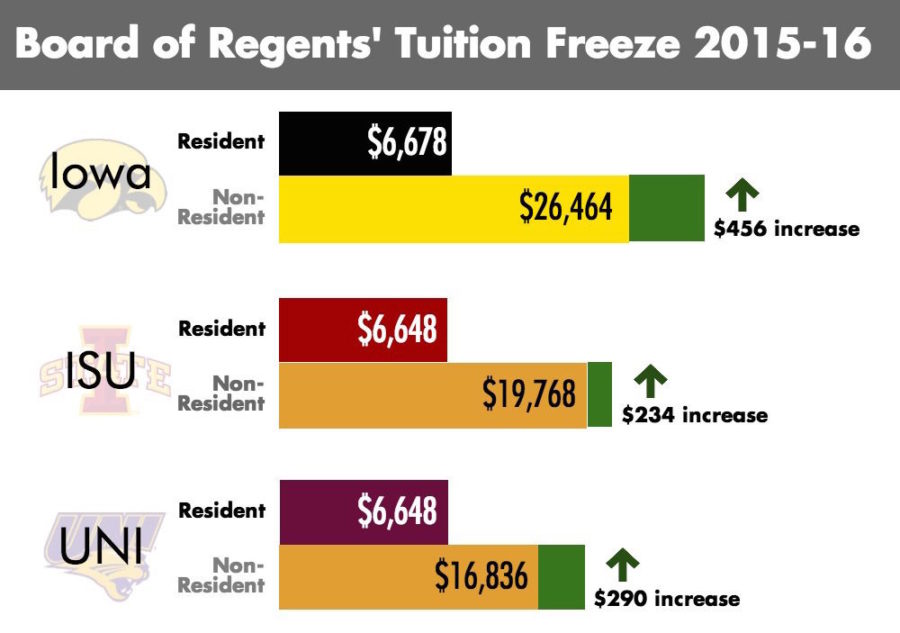Frozen: Board of Regents approves third consecutive tuition freeze
Infographic: Richard Martinez/Iowa State Daily
The Board of Regents approved a tuition freeze for Iowa’s three regent universities. While resident tuition remained the same, non-resident tuition increased.
December 4, 2014
A historic attempt to hinder the growth of student debt may have sparked both excitement and fear.
The Iowa Board of Regents unanimously approved a third consecutive tuition freeze for resident undergraduates at the Dec. 3 meeting.
The decision also included a 1.75 percent increase in tuition for nonresident undergraduates. Lawmakers must decide whether to include the requested 4.1 percent increase from the state for tuition rates to be official.
“We are confident that the board initiatives approved this year – the TIER efficiency study and the performance-based funding model – will allow the universities to direct additional resources to our students rather than asking our students to pay more,” said Board of Regents President Bruce Rastetter.
While some regents have said the move is essential in combating increasing student debt, other regents and student university leaders have expressed concern the freeze would have for future economic circumstances.
The board had originally planned on increasing in-state undergraduate tuition by 1.75 percent and out-of-state tuition by 1.2 percent at the October board meeting. But Regent Larry McKibben sparked a discussion about the rising levels of student debt, and two additional regents expressed that they, too, would support a third tuition freeze.
“The debt at sixth in the nation is a social and economic negative for our state,” McKibben said at that October meeting. “[It is important for] students to graduate without having a tremendous amount of debt, to be able to get married, have a family and maybe make a first down payment on a house, and stay in Iowa.”
McKibben repeated his concerns about increasing debt and students’ futures at the December meeting.
Though the board was unanimous in approving the freeze during discussion, Regent Robert Downer said the freeze wouldn’t affect each public university equally, mentioning University of Northern Iowa’s high percentage of in-state students. With 92 percent of UNI students paying in-state tuition, a freeze could cause Northern Iowa to lose $1.4 million in revenue.
Downer also mentioned the University of California’s decision to raise tuition by 5 percent for the next five years after a three-year tuition freeze.
“I believe the public interest is better served by gradual increases roughly reflecting inflation, a factor that is present in all of our lives,” Downer said.
Rastetter said he understood Northern Iowa’s situation, but defended the freeze with the recently approved performance-based funding model, saying the model is designed to help all three universities.
“This board knows and understands the reason we voted for performance funding is that equitable financing and funding of our public universities,” Rastetter said. “Our legislative request is going to be a little over 4.1 percent of significant new dollars to make sure all three universities are well funded.”
UNI student body president Kevin Gartman voiced support for a tuition freeze at an earlier meeting, saying students would support a modest increase for the university.
“They support the increase because they understand, that without it, [Northern Iowa] faces even greater funding challenges, which can negatively impact the quality of the education the university is able to provide,” Gartman said at the October meeting.
Northern Iowa isn’t the only school to express concern with the tuition freeze. ISU Government of Student Body President Hillary Kletscher also said she has heard student feedback in support of a modest increase to prevent a later hike in tuition.
“I heard feedback from students [who] were willing to burden the small increase especially knowing that out-of-state students were continuing to burden an increase,” Kletscher said. “If there was going to be a tuition freeze, they didn’t want to see out-of-state student tuition rise above that 1.2 percent, which it ultimately did when the regents made their decision.”
Board policy states that non-resident tuition must cover the full cost of their education.
The week before fall break, Kletscher wrote a letter to the state assembly saying students were hesitant to support a third tuition freeze.
“Students are worried that that could mean we don’t pay now, but it means large hikes later,” Kletscher said. “Those large hikes aren’t something that families can plan for. That was one of the most important pieces I got from students.”
Kletscher suggested that, if tuition is frozen again this year, the regents should consider working with the state assembly to create a long-term tuition plan.
Gov. Terry Branstad and Lt. Gov. Kim Reynolds both applauded the regents’ decision.
“We commend the Iowa Board of Regents for working with us to give Iowa students access to affordable, high-quality education in Iowa,” Branstad said in a statement.
The legislature will begin working on the state budget, but Rastetter said he was confident in the tuition freeze continuation.
“I think our legislative request is sound,” Rastetter said. “I think it’s important to send the message to parents and their students that we’re going to try to become more efficient.”







